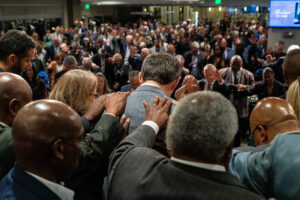
NASHVILLE, Tenn. (BP)–A new study of attendance at Southern Baptist Convention annual meetings shows the percentage of messengers in the 18-39 age group steadily declining since 1980 -– the early days of the SBC’s Conservative Resurgence -– and dropping sharply since 2004. The percentage of messengers in the 60-plus age group, however, has increased dramatically.
Conducted by LifeWay Research, the study analyzed messenger registration survey data for every annual meeting since 1980 for three major age groups: 18-39, 40-59 and 60-plus.
The findings include:
— Messengers ages 18-39 represented 33.6 percent of the total in 1980 but dropped to 13.1 percent by 2007.
— The 40-59 group stayed fairly constant: 49.9 percent in 1980, compared to 51.6 percent in 2007.
— Registrants age 60 and above accounted for 12.9 percent of the messengers in 1980, but 35.4 percent in 2007.
“This sample represents all messengers, and historically 40 percent of the messengers have been senior pastors,” said Ed Stetzer, director of LifeWay Research. “The percentage of senior pastors attending the annual meeting has remained relatively constant, but the age of attendees has risen dramatically.
“Simply put, the proportion of those under 40 attending the SBC is declining precipitously –- down by more than 50 percent since the beginning of the Conservative Resurgence.”
The study was prompted by anecdotal evidence, said Scott McConnell, associate director of LifeWay Research. “We heard a lot of people make comments like, ‘It looks like the attendees at the Southern Baptist Convention are getting older,'” he said.
Response rates to the convention’s messenger survey vary from year to year, “but the methodology was pretty consistent,” McConnell said. “Many of the questions have remained the same, so there are some pretty good comparisons you can do through the years.”
The highest year for 18-39 attendance was 35.9 percent at the 1985 meeting in Dallas, followed closely by 35.8 percent the next year in Atlanta, according to the data. By the 1992 meeting in Indianapolis, however, participation in that age group had dropped to 27.4 percent, and the slide continued with few exceptions until the 2005 meeting in Nashville, when it fell to 16.1 percent.
The 60-plus age group, on the other hand, did not consistently begin to break the 20 percent mark until the 1990 meeting in New Orleans (21.6 percent) and jumped sharply for the 2005 meeting, from 17.6 percent the year before at Indianapolis to 31.1 percent in Nashville.
“Obviously, some of the fluctuation year to year can be attributed to the city in which the meeting is being held -– the travel involved, the expense of traveling, the appeal of a particular city,” McConnell said. “But even as you compare meetings in the same city on different years, you still see a clear decline [in younger attendees].
“For example, the 1991 and 1995 meetings both were held in Atlanta, which tends to be one of the better locations for young adults because of its convenience in the Southeast. The 18-39 age group accounted for 30.6 percent of the messengers in 1991 but only 24.8 percent in 1995. While Dallas attracted 35.9 percent of young adult messengers in 1985, this dropped to 24.6 percent in 1997.
“This is a clear decline over time,” McConnell said. “The other two age groups are both increasing, and 60-plus is increasing more markedly. The general trend is the aging of attendees at the Southern Baptist Convention.”
While the 18-39 age group represents 17 percent of Southern Baptist senior pastors, it mustered only 13.1 percent of attendees at the 2007 annual meeting. The 60-plus age group constitutes 24 percent of senior pastors yet accounted for 35.4 percent of the 2007 attendees.
“Oddly enough, in some quarters there has actually been a debate about whether the SBC attendance is aging and losing its young leaders,” Stetzer said. “Of course, facts don’t convince everyone. My hope is that now, finally, we will stop debating and instead ask the hard question: ‘What is causing so many young leaders to stay away?'”
–30–
Mark Kelly is a freelance writer based in Gallatin, Tenn.
















